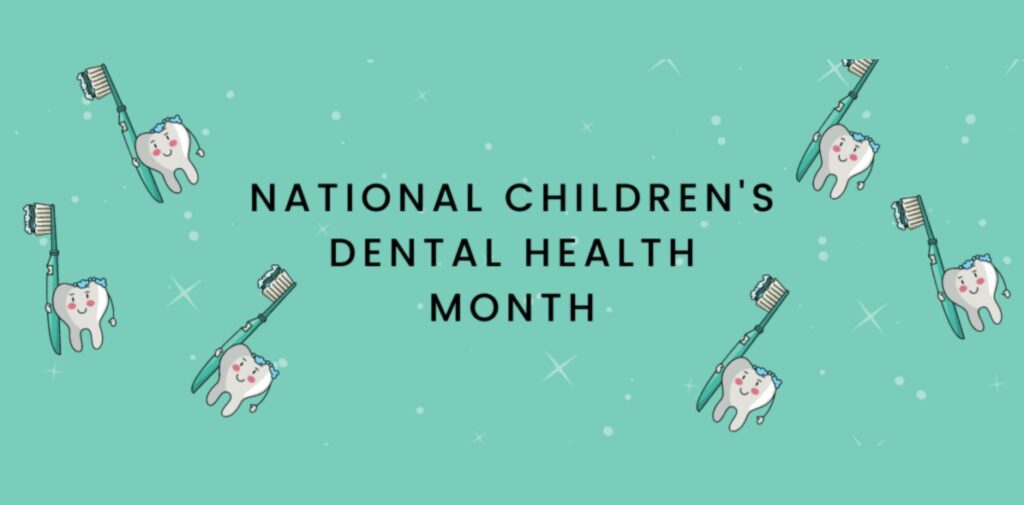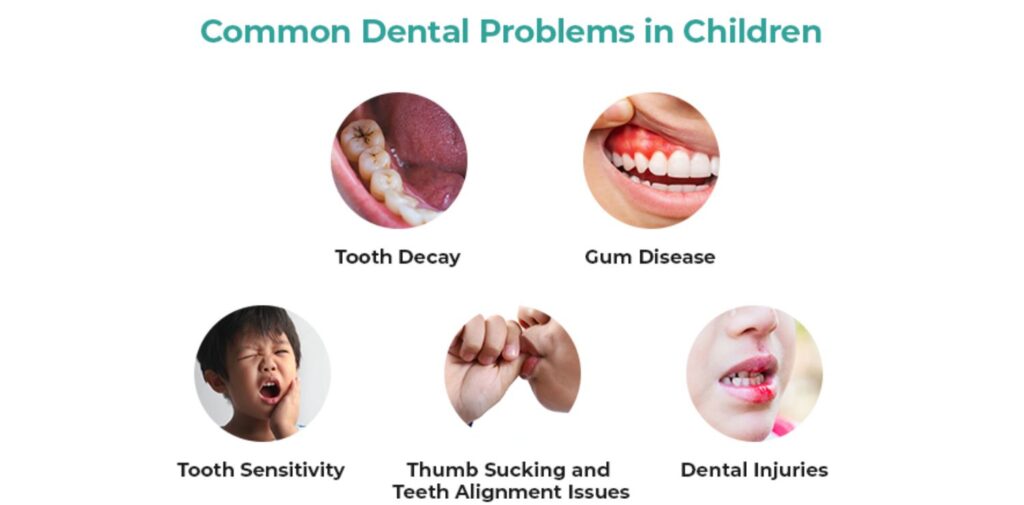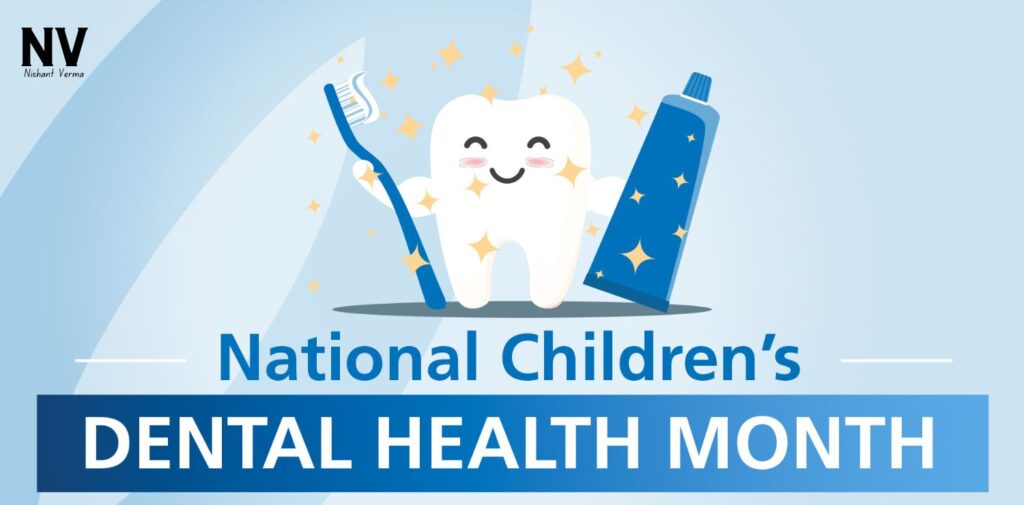National Children Dental Health Month is observed every year in February, with a special focus on promoting good oral hygiene habits in children. This month-long event is an important time to educate families, schools, and communities about the importance of dental health. In India, where dental care is often overlooked, especially in rural areas, this initiative is a much-needed reminder for both children and their parents about the significance of healthy teeth and gums.
This article explores the importance of National Children Dental Health Month, the role of oral hygiene in children’s overall well-being, and tips for parents and caregivers on how to establish healthy dental habits for their children.
What is National Children Dental Health Month?
National Children Dental Health Month, often referred to as NCDHM, is an initiative launched by the American Dental Association (ADA) in 1941 to raise awareness about the importance of oral health in children. Although this is an initiative that originated in the United States, its relevance extends globally, including in India, where dental care practices are improving but still need more attention.
During this month, dental professionals, schools, healthcare providers, and community organizations come together to host events, share educational materials, and provide free dental check-ups to children. The aim is to educate children about how to take care of their teeth and why dental health is crucial not only for a beautiful smile but also for overall health. The theme of the month varies each year, but it always emphasizes brushing, flossing, and regular dental visits.

Why is Dental Health Important for Children?
Oral health is a crucial part of a child’s overall health. Just like healthy eating habits, good dental hygiene plays an important role in a child’s growth and development. Children’s teeth are not only important for chewing food but also for speaking clearly, maintaining facial structure, and setting the stage for good oral health throughout life. Here are a few reasons why dental health is important for children:
- Preventing Cavities and Tooth Decay: Cavities are one of the most common dental problems children face. Poor oral hygiene, especially not brushing or flossing regularly, allows plaque and bacteria to build up, leading to tooth decay. Cavities, if untreated, can cause pain, difficulty eating, and, in some cases, the loss of a tooth. This is why early dental care is important for preventing these issues.
- Promoting Healthy Growth and Development: Children’s teeth help them chew food properly, which is essential for healthy digestion. When a child has dental problems, they may find it difficult to eat, which can affect their overall nutrition and health. Healthy teeth also support proper speech development.
- Boosting Self-Confidence: Healthy teeth and a beautiful smile can significantly boost a child’s self-esteem. Children who are not self-conscious about their teeth are more likely to be confident in social settings, such as school or extracurricular activities. On the other hand, dental problems like bad breath or crooked teeth can cause embarrassment, making children hesitant to smile or talk.
- Preventing Future Dental Issues: Establishing good dental habits in childhood sets the foundation for a lifetime of healthy teeth. By learning to brush and floss properly, children are less likely to develop gum disease, tooth decay, or other serious dental conditions later in life.

How Can Parents Help Their Children with Dental Care?
Parents play a critical role in ensuring their children practice good dental hygiene. From the time a child’s first tooth appears, it’s important to start taking care of it. Here are some tips for parents on how to help their children maintain healthy teeth:
- Start Early with Good Habits: The moment your baby’s first tooth appears, it’s important to start brushing it with a soft, infant-sized toothbrush and water. This helps get your child accustomed to brushing from a young age. By the time children are two or three years old, they can start using a small amount of fluoride toothpaste.
- Teach Children How to Brush and Floss Properly: Once children are old enough to brush their own teeth, parents should teach them the correct technique. This includes brushing for two minutes twice a day, making sure to reach all surfaces of each tooth, and using gentle circular motions. Flossing is also essential, as it helps clean between the teeth where a toothbrush can’t reach. Parents should supervise brushing and flossing until children are at least seven or eight years old.
- Limit Sugary Snacks and Drinks: A diet high in sugary foods and drinks is one of the biggest contributors to tooth decay. Parents should limit their children’s intake of sweets, chocolates, and sugary drinks, such as sodas and juices. Instead, encourage them to eat healthy snacks like fruits, vegetables, and nuts, which help keep teeth strong and healthy.
- Regular Dental Check-Ups: Regular dental visits are a must for every child, starting around their first birthday. These visits help identify potential dental issues early on, such as cavities, misalignment of teeth, or gum problems. A dentist can also provide professional cleaning and fluoride treatments to help protect your child’s teeth.
- Use Fluoride Products: Fluoride is a mineral that helps strengthen tooth enamel and prevent cavities. Make sure your child uses fluoride toothpaste and drinks fluoridated water, if available. Your dentist may also recommend fluoride treatments during check-ups to provide additional protection against cavities.
- Wear a Mouthguard for Sports: If your child participates in sports, wearing a mouthguard is essential to protect their teeth from injury. Many sports, like football, basketball, and cricket, carry a risk of mouth injury, and a mouthguard can help prevent broken or knocked-out teeth.

Common Dental Problems in Children
Children can face a variety of dental problems, many of which are preventable with proper care. Some of the most common dental issues among children include:
- Cavities (Tooth Decay): As mentioned earlier, cavities are the result of plaque buildup on the teeth, which can lead to decay. Cavities can cause pain and lead to the loss of teeth if not treated. The best prevention is brushing, flossing, and limiting sugary foods.
- Gum Disease (Gingivitis): Gum disease is an infection of the gums caused by poor oral hygiene. It can lead to swollen, bleeding gums and, if untreated, may cause tooth loss. Gum disease can be prevented by brushing the teeth properly, flossing, and visiting the dentist regularly.
- Tooth Sensitivity: Some children may experience tooth sensitivity to hot, cold, or sweet foods and drinks. This can be caused by worn enamel or cavities. If your child has sensitive teeth, consult with a dentist to determine the cause and appropriate treatment.
- Misalignment of Teeth (Malocclusion): Misalignment of teeth or bite problems are common in children. Braces or other orthodontic treatments may be necessary to straighten teeth and improve bite alignment.
- Thumb Sucking and Pacifier Use: While it’s normal for infants to suck their thumbs or pacifiers, extended thumb sucking can affect the alignment of the teeth and jaws. If your child continues this habit beyond the age of three, it may be time to discuss strategies to break the habit with your dentist.
Conclusion: A Bright Smile for a Healthy Future
National Children Dental Health Month is an opportunity to reflect on the importance of oral hygiene for children and to take steps toward ensuring a lifetime of healthy teeth. For parents in India, it is essential to establish good dental habits early, provide healthy food choices, and take children for regular dental check-ups. Through proper education and care, we can help children achieve bright, healthy smiles and avoid painful dental problems in the future.
By making dental care a priority and incorporating it into daily routines, we are setting the foundation for healthier lives. A beautiful smile is not only a sign of good health but also boosts confidence and self-esteem. Let’s celebrate National Children Dental Health Month by teaching our children the importance of maintaining healthy teeth – for their benefit today and for a better, healthier tomorrow.




